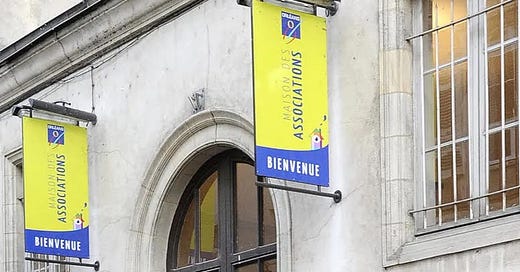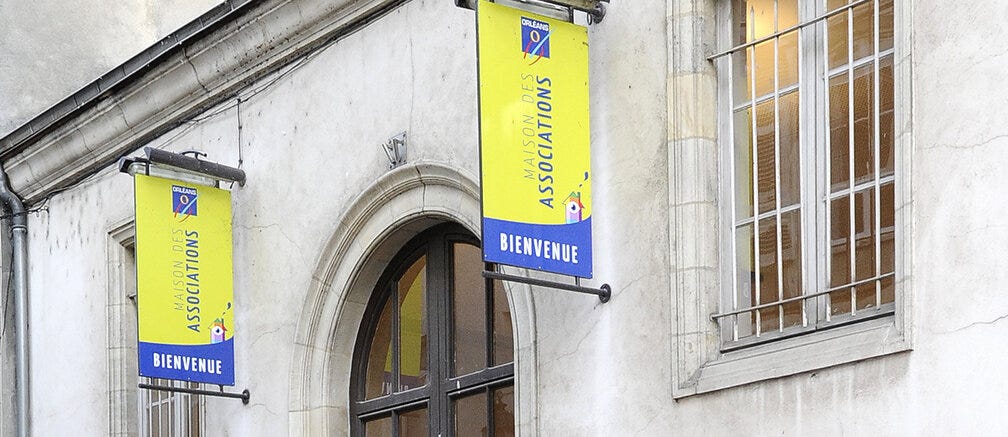An approach to adapting linguistically in France
Associations sometimes offer opportunities for honing language skills, and more
If you’re a relative newcomer to France, have a some knowledge of French but want to gain fluency in informal daily conversation, there are many possibilities that do not involve a computer or mobile phone screen. Some of these opportunities are sponsored by associations.
Although I already had a good foundational knowledge of French when moving to Nice, Côte d’Azur at the end of 2021, our first months comprised a coming to consciousness of the French I had never learned, that is, the things that aren’t taught in your average American French classes. Some examples: the language used in official documents required to transfer our citizen’s rights from Ireland to France; the processes for exchanging drivers licences; all the fine print when opening bank accounts and insurance policies; understanding housing agreements; registering with the national healthcare system; and all the other démarches administratives (administrative procedures).
As these administrative processes fell into place, however, another linguistic weakness made itself known that was partially based in language knowledge, and partially in culture and attitude: ordinary everyday conversation and small talk.
It’s easy enough to gain fluency in the kinds of transactions that are part of everyday life—interactions with staff at the market, bakery, or at the till in a supermarket; buying necessities at the hardware store; making an appointment on the telephone. I say these are easy because they are repetitive and involve a limited vocabulary—every transaction becomes a brief language drill. (Just make sure you can tell the time of day and know numbers well enough to easily recognise them!) But find yourself in a conversation with someone unexpectedly—a friendly person at a bus stop or discussing the weather with a neighbour—and the arbitrary excursion into small-talk can become tricky quickly.
I had had a strategy for upgrading my abilities in French well before taking up residence in France—radio, television, newspaper subscriptions, youtube videos (a nice feature is being able to slow the tempo down and repeat when needed), language apps, even Alliance Française classes online. But none of these is a substitute for actually conversing with French people. We were new in town, and had no local friends or personal contacts. What to do ?
France, like other European countries, has many associations, ranging from informal groups of people with common interests to large entities with legal obligations.1 I happened upon the Maison des Associations at Place Garibaldi, Nice, whose exterior bulletin board has notices advertising many local associations—several of which focused on language learning. I followed up with one of them and learned that, by becoming a paid member (€30 annually), I would be eligible to participate in a range of activities sponsored by the group, including a weekly informal gathering at a café to exchange French and English language conversations, as well as a weekly atelier or “advanced French workshop” that has a more literary inclination.
Once I’d become a member of the association I joined the conversation group at one of its Tuesday morning gatherings at a café. The timing of the meeting should have tipped me off to this being a group of seniors and retirees, and so it was, and it is a friendly and welcoming group at that. There were no formal introductions, I simply introduced myself to those seated closest to me. It became apparent quickly that I was one of a small handful of native English speakers present.
Formally the “rule” was that conversation would be undertaken for one hour in French, and for one hour in English. The first order of business is choosing which language to start with. On my first meeting with this group we began with English, but it quickly migrated back to French. The person seated next to me explained that most of the people who attend have done so for years and that it is now more of a social gathering than a structured learning experience. Others also explained that there had previously been a near balance of French and English speakers, but the majority of British attendees disappeared once Brexit took hold. All the better for me, since my personal goal was to gain better fluency in French day-to-day conversation, and most of the conversation takes place in French.
The members of this association are diverse and attend the Tuesday morning meeting as mood and possibility allow. It’s like a small-talk language immersion programme. Topics arise spontaneously and change as quickly as they appear. Sometimes the topic is obscure to someone who is not a long-time resident of France or Nice, which means learning some new tidbit about the culture, geography or local politics and politicians, for example. And everyone is curious linguistically—so interrupting a chat to ask that an unfamiliar word be explained can lead to an entirely new topic of conversation.
For me, this kind of experience helped address the biggest barrier I had to speaking spontaneously in French: shyness, reticence and hesitation. These days I don’t hesitate and just keep talking, even when I hear mistakes issuing from my lips as I express myself.
The atelier in “advanced French” is very different. It is led by a retired French teacher and attended generally by four to eight people. Each one-and-a-half-hour session involves reading—usually something from a literary work, magazine or a newspaper. Then discussion of grammar, vocabulary (there is always something new), application thereof, and of the topics covered. Occasionally there will be exercises that feel somewhat pedantic—lists of words and their antonyms or synonyms, crossword puzzles, etc. The workshop is also sometimes followed by a separate group that plays a Scrabble-in-French game (which I’ve chosen not to join). Sometimes it is followed by a lecture, which typically attracts forty or so primarily French attendees. (Some association members also meet regularly to play pétanque.)
I soon learned from association members of another association, this one an informal group without legal status, that sponsors a weekly French-English language exchange. I made contact by email and was welcomed into the fold. This particular group was founded by three friends years ago and is organised primarily by a French gentleman who lived much of his adult life in the United States—he is perfectly bilingual. Like the other association, its members are mostly retirees and the proportion of English to French speakers is unbalanced in the opposite direction: the ratio of French to English speakers is about 1:2. It is an informal association without legal status and participation costs €20 annually plus €3 per meeting to pay for the meeting venue.
The organiser places people together in groups of three or four (or sometimes just two) and conversation proceeds for one hour in each language. He also distributes a document each week to serve as a potential basis for conversation. These are in fact interesting in themselves, usually elaborating on topics of local historical or cultural interest. But so far in my experience they have never played a role in the actual conversation that unfolds. Rather, conversation seems to unfold organically. Introductions often lead to interesting chats since, as it turns out, the attendees at these events tend to have certain things in common. The language interest is obvious. For many of the French participants this is linked to travel, since English has become the lingua franca of tourism; some also have English speaking spouses; and there are several former French or English teachers. There are also French participants who grew up in diplomatic families, moving here and there as assigned, and others who were born in former French colonies.
Perhaps half of the native French speakers are also native Nice residents, and I always enjoy hearing their perspectives. Some were raised speaking both French and Italian; a couple also speak the niçois dialect, though they have differing opinions about whether it is a Provençal language or a Liguorian dialect. (There is also an association, Nissa Pantai, that promotes appreciation of “the use and love of the dialects of the Occitan language and, more particularly, Nissart and Alpin.”)
The English speakers are, I think, even more diverse. There are people from the United States, Canada, Ireland, the United Kingdom, Singapore, Australia and elsewhere. Many have arrived in Nice over the past several years, which means that conversations sometimes move to newcomer issues: visa renewals, problems or successes in registering for this or that public service; and of course the challenges of trying to master French language. I am always curious about the reasons why Americans in particular moved to France. Healthcare is one reason sometimes given, whereas others are fulfilling a francophile retirement dream; still others are fleeing some other aspect of American culture that has become oppressive. Expressing yourself about these sometimes emotional topics in French can be challenging if you’re at even an intermediate level in French.
Beyond these specifically language-oriented associations, joining some other group focused on an activity or pastime might help with both language development and having a sense of joining the community you’re in. Check out my piece on Associations for more about this. If you’re over 55 or retired, there may be civic groups sponsoring activities and services for séniors—ask about this at the local mairie as well. (The City of Nice supports twelve Maisons des Associations and five different maisons des séniors.)
There are also more formal educational venues, such as Alliance Française, as well as commercially sponsored social and language groups. There is Meetup, the company that fosters meetings among people with common interests which operates internationally. For a higher annual membership fee there is also InterNations, another international organisation focused on sponsoring activities connecting expats through social events.
No matter what path you choose or where you live in France, chances are there are many possibilities for enhancing your abilities with French and engaging with local people socially. You just have to look for them.
“Les différentes formes d’association” https://www.associations.gouv.fr/les-differentes-formes-d-association.html (consulted 22 November 2022)





Another thoughtful, well-written and helpful article for people looking to integrate abroad. Thank you as always for sharing your experience!
These are great ideas, and fortunately for you Nice seems to have a lot to offer.
I came to France after teaching French in the States for 8 years, and although I was certainly fluent, I was likely C1 level -- still considered adequate to teach -- rather than C2. I too learned a lot dealing with French bureaucracy and becoming part of French society. For example, I learned a ton from taking and passing the drivers' license test, which was a big language learning experience, as well as bearing children!
It's interesting you mentioned the "pedantic" exercises in one of your language groups. After teaching English here for years, I took the Cambridge Delta teacher training program and became aware of the value of that type of exercise, which I had often poo-pooed as boring and not communicative enough. If they are too easy, they will be boring, but if they are pitched right they help reinforce your learning, especially if you go back over them.
I learned this first-hand when I took a stab at self-learning Portuguese a few years back.